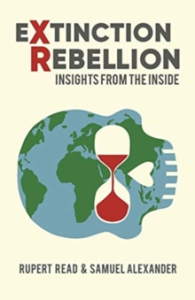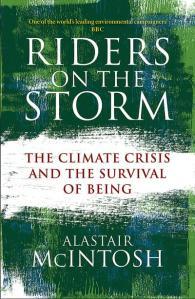Jeremy Williams's Blog, page 109
September 1, 2020
How Gabon hopes to turn off the oil tap
Gabon is a small West African country with a population of 2.1 million people. Oil was discovered in the country in the 1930s and it has at times been a significant regional producer and a member of OPEC. Revenues from oil account for around a quarter of the economy and have made Gabon statistically wealthier than many of its Sub-Saharan neighbours, though the wealth has not been evenly shared.
In the summer of 2020 however, Gabon made a remarkable announcement: they intend to remove oil from th...
August 31, 2020
Book review: Extinction Rebellion – Insights from the Inside
 Extinction Rebellion returned to the streets of London this week, so it’s a good time to be looking at some of the inner workings of the movement and assessing their ongoing relevance. This book is a good way to do that. It collects together the writings of Rupert Read, one of the main thinkers and spokespersons of the movement, under the editorship of Samuel Alexander.
Extinction Rebellion returned to the streets of London this week, so it’s a good time to be looking at some of the inner workings of the movement and assessing their ongoing relevance. This book is a good way to do that. It collects together the writings of Rupert Read, one of the main thinkers and spokespersons of the movement, under the editorship of Samuel Alexander.
Extinction Rebellion: Insights from the Inside draws on a range of sources. There are pamphlets and open letters, a transcript ...
August 29, 2020
What we learned this week
For many households, including mine, the single biggest energy user is the fridge, so energy efficient fridges can make a significant difference to bills and to emissions. Could governments run a scrappage scheme for old fridges, or discounted fridges for low income households to help cut their energy costs? I was wondering about this, and discovered that Kazakhstan have already tried it.
The Dow Jones Industrial Average tracks the performance of the biggest 30 companies in America. Exxon Mobil ...
August 28, 2020
Building of the week: Greenwich modular homes
I’ve written before about the merits of modular construction. It’s faster, cheaper, less disruptive and less wasteful. Buildings can be constructed in factory conditions, which keeps things dry and allows for a higher degree of precision. It’s much easier to dismantle buildings afterwards if they are made of modular components rather than thousands of individual bricks.
The construction industry in Britain has been slow to adopt off-site techniques, despite a real shortage of affordable homes. S...
August 27, 2020
Can we stop advertising SUVs?
Yesterday my family popped into Harpenden for lunch and some school uniform shopping. Sitting outside a tapas bar, I was struck by how many cars in the street were Sports Utility Vehicles. I presume this is because Harpenden is wealthier and people can afford to buy and run larger vehicles, but it definitely felt worse than where we are in Luton. Every other car seemed to be a vast gas-guzzling BMW or Audi. As if to highlight the difference, we were repeatedly passed by a bright red Nissan Leaf ...
August 26, 2020
Better Origin: a high tech approach to insect farming
Three summers ago I did a project on edible insects, sourcing and trying as many insect based foods as I could get hold of in Britain. While plenty of them lived up the the ‘edible’ description, most didn’t go any further than that. Among my conclusions were that 1) insect based foods were more promising than convincing people to eat insects themselves. And 2) it would make more sense to grow insects for animal food.
With that in mind, I was pleased to come across Better Origin, an start-up comp...
August 25, 2020
What is climate privilege?
To be privileged is to have a certain advantage in life, usually unquantifiable. Because it is inherent to who we are, it is often easier to spot privilege in other people than in ourselves. We take our own privileges for granted, see them as normal, and it can feel like an affront when someone points them out. The personal nature of privilege makes it a difficult topic to talk about.
It’s also a slippery subject because the advantages of privilege are intangible. As the psychologist John Amaech...
August 24, 2020
Book review: Riders on the Storm, by Alastair McIntosh
 Riders on the Storm is the latest book from Alastair McIntosh. It revisits some of the themes of his earlier book on climate change, Hell and High Water, almost ten years later and in quite a different tone.
Riders on the Storm is the latest book from Alastair McIntosh. It revisits some of the themes of his earlier book on climate change, Hell and High Water, almost ten years later and in quite a different tone.
It’s a book with three distinct parts. The first is a summary of the latest climate science. The IPCC released three updates in the last couple of years, on land, oceans and ice, and on 1.5 degrees. They get a chapter each here, bringing the reader up to speed on the science and how establis...
August 22, 2020
What we learned this week
This is a headline to warm the heart: Oil companies wonder if it’s worth looking for oil any more.
Why garbage men should be paid more than bankers. Rutger Bregman writes about the difference between creating wealth and accumulating it in typically forthright fashion.
After an absence of 6,000 years, wild bison are due to be re-introduced to Britain in a rewilding project in the Blean Woods, Kent. It’s always great to see a missing species back where it belongs, but bison are also useful in rege...
August 21, 2020
How far did Coronavirus move Earth Overshoot Day?
Earth Overshoot Day is calculated every year by the Global Footprint Network and WWF. It represents the day that humanity uses up a sustainable share of the planet’s resources and starts to go into ecological debt. The earlier in the year that the day falls, the faster we are using up the resources.
We can use more resources than the earth can naturally regenerate in a year, but only by taking an unsustainable amount – catching fish faster than stocks can be replenished, cutting trees faster tha...



